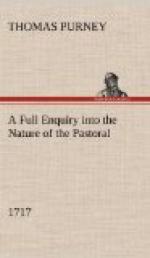Another thing which occasions Softness in the Pastoral Language, if rightly managed, is the use of Compound Words. But there is nothing requires a greater Genius than to form Beautiful Compound Words in Epick Poetry, or more Exactness and Labour in Pastoral. In Epick Poetry ’tis absurd to make a Compound Word, unless it helps forward the Sence; and in Pastory, it must add to the Softness of the Dialect, and in some measure assist the Thought, yet it need not do it so much as in Epick Poetry; where a Writer of Genius will form such Compound Words as will each contain as much as a whole Line. As may be seen in Homer, and the Greek Poets, especially. Among the English, Milton’s are often very fine.
Brandish’d aloft the horrid Edge
came down,
Wide-wasting.
The Compound Words, in Pastory, must be so easy and natural, as scarce to be observ’d from the other Language. They must run easy and smooth, and glide off the Tongue, and that will occasion their not being observ’d in the reading.
A Pastoral Writer will often be able, if he gives an Image in one Line, by a Compound Word in that Line to give another Image, or another Thought as full and as fine an one as that which the whole Line contains. But as this and the like Observations cannot be well understood without Instances quoted, I shall leave ’em to the Observation of those who intend to engage in Pastoral Writing; for that and nothing else, will put ’em upon a thorough Search into the Springs and Rules by which all former Pastoral Writers have excell’d.
SECT. 4.
Of Turns of Words and Phrazes.
Another help to Softness, and the very greatest Beauty of all in the Pastoral Language, is, a handsome use of Phrazes. This must depend entirely on the Genius of the Writers, for there is no one Rule can be given for the attaining thereto. A Person who writes now may imitate Ovid and Spencer in this particular (if he can submit his Fancy to Imitation) and that is all the Assistance he can have. As for rural Phrazes, there are not above half a dozen in all the Counties or Dialects that I am acquainted with.
All that we can do on this Head, is to leave the Reader to Observation. For I confess that I do not so much as know how I came by those few I myself have, farther than that by use and practising in an Uncommon Dialect, I happen’d on ’em at Unawares.
However I may quote those which are the very finest of any in Spencer. Who is the only Writer in our Language that ever attempted tender Phrazes or Turns of Words. Yet there are two such Passages in Creech’s Theocritus, which I will also quote.
All as the Sheep, such was the Shepherd’s
Look;
For pale and wan he was (alas the while!)
&c.
And again.
Ye Gods of Love, who pity Lover’s
Pain.
(If any Gods the Pain of Lovers pity)
&c.




